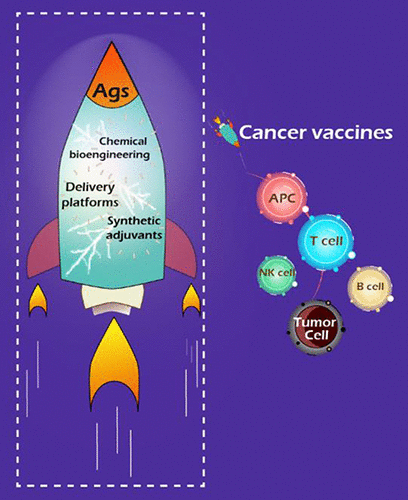当前位置:
X-MOL 学术
›
Chem. Rev.
›
论文详情
Our official English website, www.x-mol.net, welcomes your
feedback! (Note: you will need to create a separate account there.)
Chemical Strategies to Boost Cancer Vaccines.
Chemical Reviews ( IF 51.4 ) Pub Date : 2020-09-11 , DOI: 10.1021/acs.chemrev.9b00833 Wen-Hao Li 1 , Yan-Mei Li 1, 2, 3
Chemical Reviews ( IF 51.4 ) Pub Date : 2020-09-11 , DOI: 10.1021/acs.chemrev.9b00833 Wen-Hao Li 1 , Yan-Mei Li 1, 2, 3
Affiliation

|
Personalized cancer vaccines (PCVs) are reinvigorating vaccine strategies in cancer immunotherapy. In contrast to adoptive T-cell therapy and checkpoint blockade, the PCV strategy modulates the innate and adaptive immune systems with broader activation to redeploy antitumor immunity with individualized tumor-specific antigens (neoantigens). Following a sequential scheme of tumor biopsy, mutation analysis, and epitope prediction, the administration of neoantigens with synthetic long peptide (SLP) or mRNA formulations dramatically improves the population and activity of antigen-specific CD4+ and CD8+ T cells. Despite the promising prospect of PCVs, there is still great potential for optimizing prevaccination procedures and vaccine potency. In particular, the arduous development of tumor-associated antigen (TAA)-based vaccines provides valuable experience and rational principles for augmenting vaccine potency which is expected to advance PCV through the design of adjuvants, delivery systems, and immunosuppressive tumor microenvironment (TME) reversion since current personalized vaccination simply admixes antigens with adjuvants. Considering the broader application of TAA-based vaccine design, these two strategies complement each other and can lead to both personalized and universal therapeutic methods. Chemical strategies provide vast opportunities for (1) exploring novel adjuvants, including synthetic molecules and materials with optimizable activity, (2) constructing efficient and precise delivery systems to avoid systemic diffusion, improve biosafety, target secondary lymphoid organs, and enhance antigen presentation, and (3) combining bioengineering methods to innovate improvements in conventional vaccination, “smartly” re-educate the TME, and modulate antitumor immunity. As chemical strategies have proven versatility, reliability, and universality in the design of T cell- and B cell-based antitumor vaccines, the union of such numerous chemical methods in vaccine construction is expected to provide new vigor and vitality in cancer treatment.
中文翻译:

促进癌症疫苗的化学策略。
个性化癌症疫苗 (PCV) 正在重振癌症免疫治疗中的疫苗策略。与过继性 T 细胞疗法和检查点阻断相反,PCV 策略通过更广泛的激活来调节先天性和适应性免疫系统,以重新部署具有个体化肿瘤特异性抗原(新抗原)的抗肿瘤免疫。按照肿瘤活检、突变分析和表位预测的顺序方案,使用合成长肽 (SLP) 或 mRNA 制剂施用新抗原可显着提高抗原特异性 CD4+ 和 CD8+ T 细胞的数量和活性。尽管 PCV 前景广阔,但在优化疫苗接种程序和疫苗效力方面仍有很大潜力。特别是,基于肿瘤相关抗原 (TAA) 的疫苗的艰巨开发为增强疫苗效力提供了宝贵的经验和合理的原则,自当前个性化以来,有望通过佐剂、递送系统和免疫抑制性肿瘤微环境 (TME) 逆转来推进 PCV疫苗接种只是将抗原与佐剂混合。考虑到基于 TAA 的疫苗设计的更广泛应用,这两种策略相互补充,可以导致个性化和通用的治疗方法。化学策略为 (1) 探索新型佐剂提供了广阔的机会,包括具有可优化活性的合成分子和材料,(2) 构建高效和精确的递送系统以避免全身扩散,提高生物安全性,靶向次级淋巴器官,并增强抗原呈递,以及(3)结合生物工程方法对传统疫苗接种进行创新改进,“聪明地”重新教育TME,并调节抗肿瘤免疫。由于化学策略在基于 T 细胞和 B 细胞的抗肿瘤疫苗的设计中已被证明具有多功能性、可靠性和通用性,因此疫苗构建中众多化学方法的结合有望为癌症治疗提供新的活力和活力。
更新日期:2020-10-29
中文翻译:

促进癌症疫苗的化学策略。
个性化癌症疫苗 (PCV) 正在重振癌症免疫治疗中的疫苗策略。与过继性 T 细胞疗法和检查点阻断相反,PCV 策略通过更广泛的激活来调节先天性和适应性免疫系统,以重新部署具有个体化肿瘤特异性抗原(新抗原)的抗肿瘤免疫。按照肿瘤活检、突变分析和表位预测的顺序方案,使用合成长肽 (SLP) 或 mRNA 制剂施用新抗原可显着提高抗原特异性 CD4+ 和 CD8+ T 细胞的数量和活性。尽管 PCV 前景广阔,但在优化疫苗接种程序和疫苗效力方面仍有很大潜力。特别是,基于肿瘤相关抗原 (TAA) 的疫苗的艰巨开发为增强疫苗效力提供了宝贵的经验和合理的原则,自当前个性化以来,有望通过佐剂、递送系统和免疫抑制性肿瘤微环境 (TME) 逆转来推进 PCV疫苗接种只是将抗原与佐剂混合。考虑到基于 TAA 的疫苗设计的更广泛应用,这两种策略相互补充,可以导致个性化和通用的治疗方法。化学策略为 (1) 探索新型佐剂提供了广阔的机会,包括具有可优化活性的合成分子和材料,(2) 构建高效和精确的递送系统以避免全身扩散,提高生物安全性,靶向次级淋巴器官,并增强抗原呈递,以及(3)结合生物工程方法对传统疫苗接种进行创新改进,“聪明地”重新教育TME,并调节抗肿瘤免疫。由于化学策略在基于 T 细胞和 B 细胞的抗肿瘤疫苗的设计中已被证明具有多功能性、可靠性和通用性,因此疫苗构建中众多化学方法的结合有望为癌症治疗提供新的活力和活力。











































 京公网安备 11010802027423号
京公网安备 11010802027423号